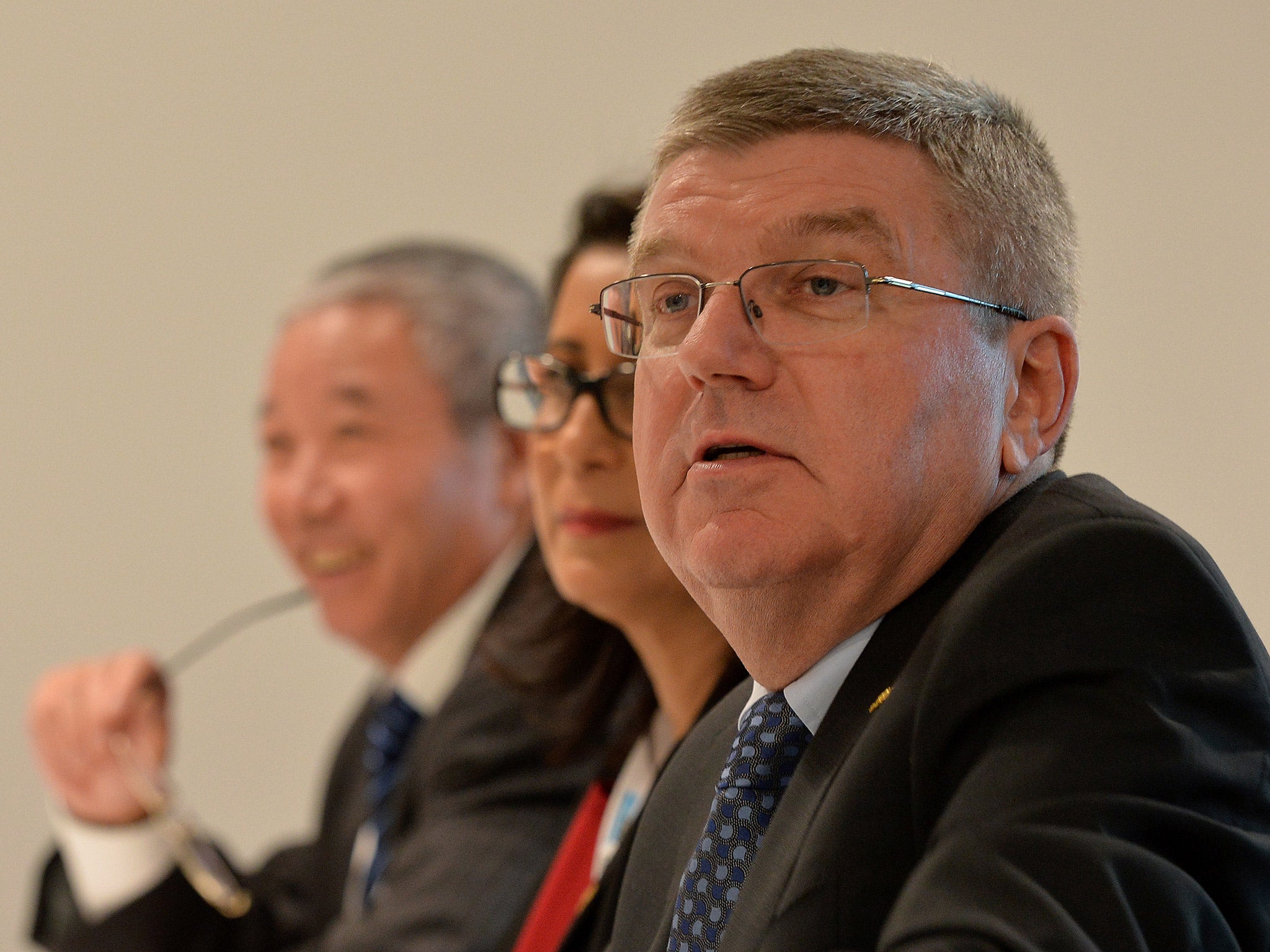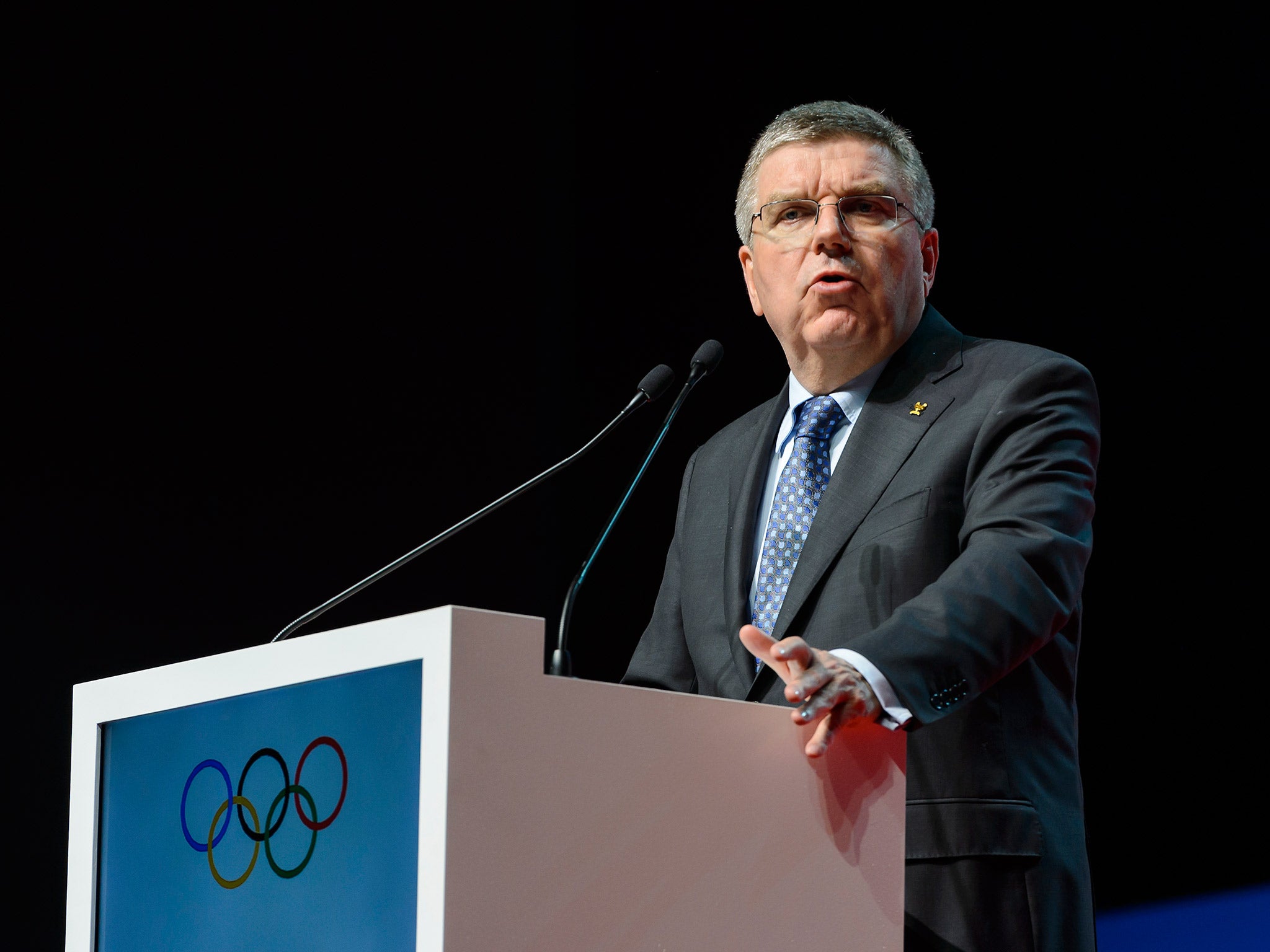Rio 2016: IOC president Thomas Bach suggests federations could face bans as doping crisis deepens
31 athletes who competed at Beijing 2008 could be banned for this summer's Olympics after their samples were re-tested

Your support helps us to tell the story
From reproductive rights to climate change to Big Tech, The Independent is on the ground when the story is developing. Whether it's investigating the financials of Elon Musk's pro-Trump PAC or producing our latest documentary, 'The A Word', which shines a light on the American women fighting for reproductive rights, we know how important it is to parse out the facts from the messaging.
At such a critical moment in US history, we need reporters on the ground. Your donation allows us to keep sending journalists to speak to both sides of the story.
The Independent is trusted by Americans across the entire political spectrum. And unlike many other quality news outlets, we choose not to lock Americans out of our reporting and analysis with paywalls. We believe quality journalism should be available to everyone, paid for by those who can afford it.
Your support makes all the difference.International Olympic Committee president Thomas Bach has suggested entire federations could be banned from the Games as the fight against doping is escalated.
The IOC on Tuesday announced it had discovered 31 positive tests after 454 samples collected at the 2008 Beijing Olympics were retested, while the World Anti-Doping Agency put its investigations manager Mathieu Holz in charge of an urgent probe into allegations of state-run doping among Russian athletes at the 2014 Sochi Winter Olympics.
Bach responded with an editorial carried by both the Daily Telegraph and USA Today stating that the IOC would apply a "zero tolerance policy not only with regard to individual athletes, but to all their entourage within its reach".
He added: "This action could range from lifelong Olympic bans for any implicated person, to tough financial sanctions, to acceptance of suspension or exclusion of entire national federations like the already existing one for the Russian Athletics Federation by the International Association of Athletics Federations."
Bach added that under such a scenario, athletes from affected nations may be required to prove their innocence rather than vice-versa.
"We would have to consider, whether in such 'contaminated' federations, the presumption of innocence for athletes could still be applied, whether the burden of proof could be reversed," he wrote.
"This could mean that concerned athletes would have to demonstrate that their international and independently proven test record is compliant with the rules of their international federation and the World Anti-Doping Code, providing a level playing field with their fellow competitors."
Referring specifically to Wada's investigation of Russia and possible state involvement in doping, Bach wrote: "Should the investigation prove the allegations true, it would represent a shocking new dimension in doping with an, until now, unimaginable level of criminality."
Holz, a former major of the French Gendarmerie and Interpol agent, will be in charge of Wada's scrutiny of the claims made in the New York Post and CBS show 60 Minutes.
Hosts Russia topped the Sochi medal table with 33 medals, 13 of them gold, but a New York Times report last week claimed performance-enhancing drug use was widespread and covered up.
Dr Grigory Rodchenkov, who was director of the country's anti-doping laboratory at the time, alleged urine samples tainted by performance-enhancing drugs were exchanged, through a wall, for clean urine collected months earlier. Similar allegations were made by former Russian Anti-Doping Agency (Rusada) employee Vitaly Stepanov.

The IOC said the 31 positive tests from the Beijing Olympics came from six different sports and 12 countries. The British Olympic Association said it was unaware of any Team GB athletes being among those caught cheating, with the IOC in the process of contacting the 12 national Olympic committees involved.
The Lausanne-based Olympic body's executive board also announced on Tuesday that the results of 250 more re-tests from London 2012 would come shortly, with further retesting of medallists from 2008 and 2012 planned, too.
A statement from the Russian Ministry of Sport read: "We are fully supportive of the decision that athletes who are doping, no matter what country they represent, should be punished and not be permitted to compete at competitions.
"However, we strongly believe that clean athletes, who have spent years of their lives training for the Games, should not be deprived of the right to participate. Moreover, we are willing to fully cooperate with Wada in their investigation and we have officially informed Wada of this."
PA
Join our commenting forum
Join thought-provoking conversations, follow other Independent readers and see their replies
Comments